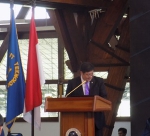Prof. Husaini Ardy Scientific Oration: Role of Material Science and Engineering in Supporting Indonesia’s Industry

BANDUNG, itb.ac.id – A professor from the Faculty of Mechanical and Aerospace Engineering (FMAE), Prof. Dr. Ir. Husaini Ardy, gave a scientific oration at the ITB West hall on Saturday (11/02/2023). In his oration titled "The Role of Material Science and Engineering in Supporting Indonesia's Industries" Prof. Husaini conveyed that in material engineering there are several problems that need to be solved when creating a material such as how to design effective casting, forming, and welding processes.
These problems hinder the creation of optimum-quality materials. The current state of Indonesia's manufacturing industry has several issues ranging from poor work environment to aged equipment. These problems are quite difficult to solve due to the lack of development in metal material engineering in Indonesia. Therefore, contributions from experts and universities are needed to develop this sector.
Prof. Ardy pointed out a case example of a steam pipe failure that he and his team handled. He said that steam pipe failure is quite common. A factory will experience major losses when a steam pipe system fails and stops operating, it also can take a whole week to repair.
The steam pipe is connected to a boiler which produces steam to move a turbine and generate electricity for the system. For pipes that are placed close to each other, failure can happen as often as three times a month. The intensity of these pipe failures causes suspicion about the maintenance problem.
This suspicion brings Prof. Ardy and his team to carry out a complete procedural analysis that includes verifications of the pipe's material chemical composition, strength, and microstructure. Then the team carried out an inspection of the metallurgical and mechanical aspects by observing the microstructure of the broken steam pipe, calculating the tangential stress of the pipe's wall, and analyzing the strength and toughness of the material at high temperatures.
After a complete analysis was finished, the team found some anomalies in the steam pipe system such as cracks and some indications of graphitization which degrade Cementite into Carbon or Graphite. Graphitization is not supposed to happen because of the rather young age of the system which is 7000 hours and its low operational temperature of 410 degrees Celsius.

Based on the discovered anomalies, Prof. Ardy and his team investigated the system documentation and found the main causes of the steam pipe failures. It was found that the problem was caused by improper pipe-cutting and repair procedures.
The team then suggested improving the maintenance procedure to reduce the frequency of failure and minimize financial losses. Prof. Ardy also gave another case example of research on the technical age of the delivery pipe. To determine the technical age of this delivery pipe, the team created a model for analyzing the effect of erosion on the pipe's wall to its ability in resisting load.
The model creation process to determine the pipe's technical age was carried out by three different teams, those are Prof. Husaini Ardy and Dr. Ir. Hermawan Judawisastra, M.Eng., from the Material Science and Engineering Research Group FMAE ITB who explained the analysis result and the physical phenomenon that took place.
In addition to that, Rachman Setiawan, S.T., M.Sc., Ph.D., and M. Agus Kariem, S.T., M.T., Ph.D. from the Mechanical Design Research Group FMAE ITB also carried out an analysis of the pipe load. This study was also participated by Prof. Udjianna Sekteria Pasaribu, Ph.D. and Sapto Wahyu Indratno, S.Si., M.Sc., Ph.D., from the Statistics Research Group FMNS ITB who analyzed gathered data in order to create a mathematical model.
Reporter: Fajris Zahrotun Nihayah (Physics, 2020)
Translator: Favian Aldilla R (Civil Engineering, 2019)

scan for download




